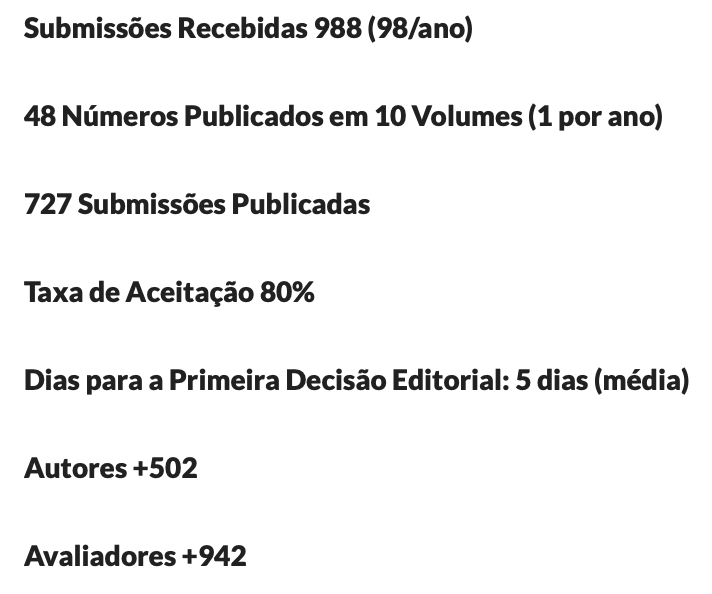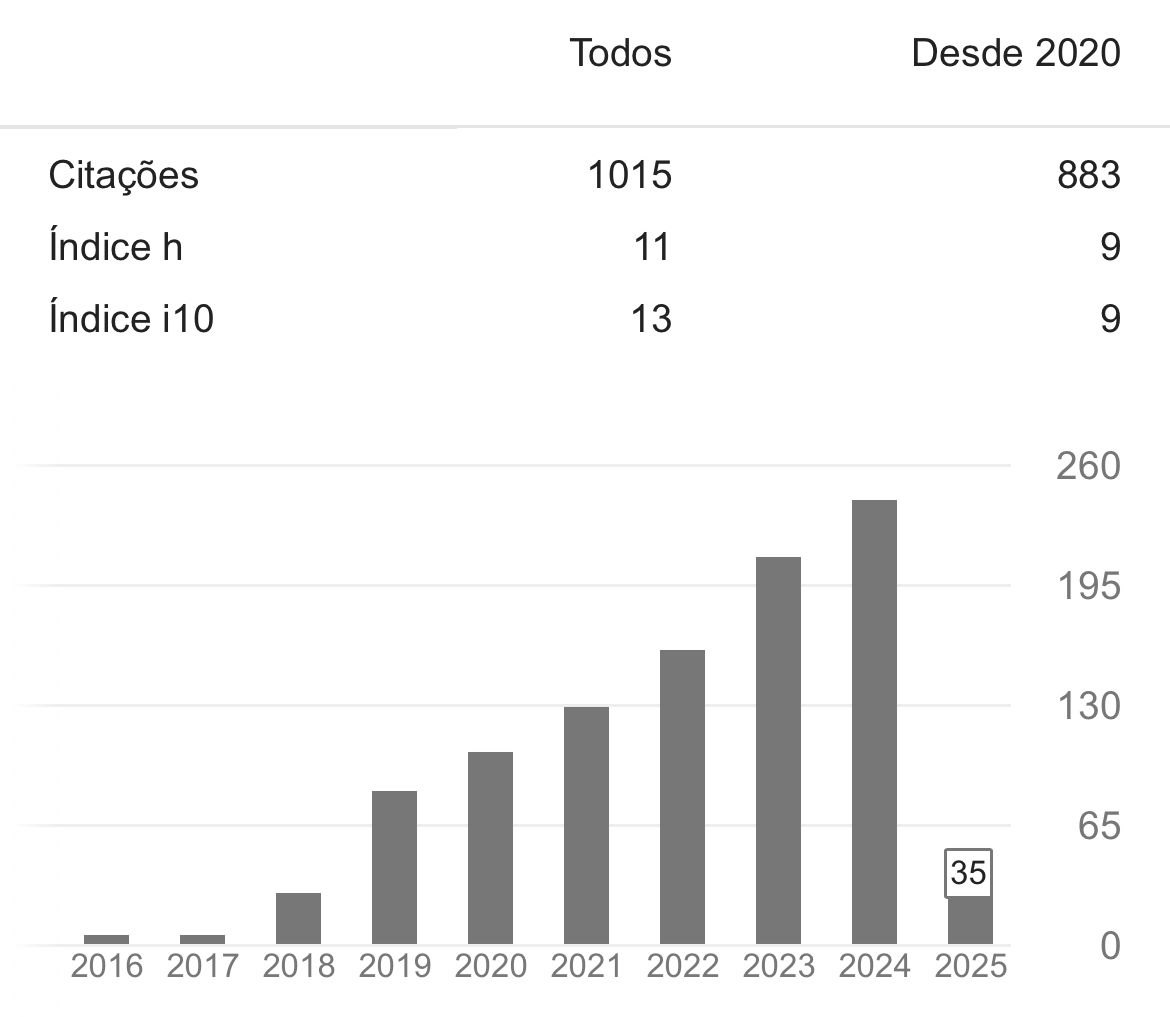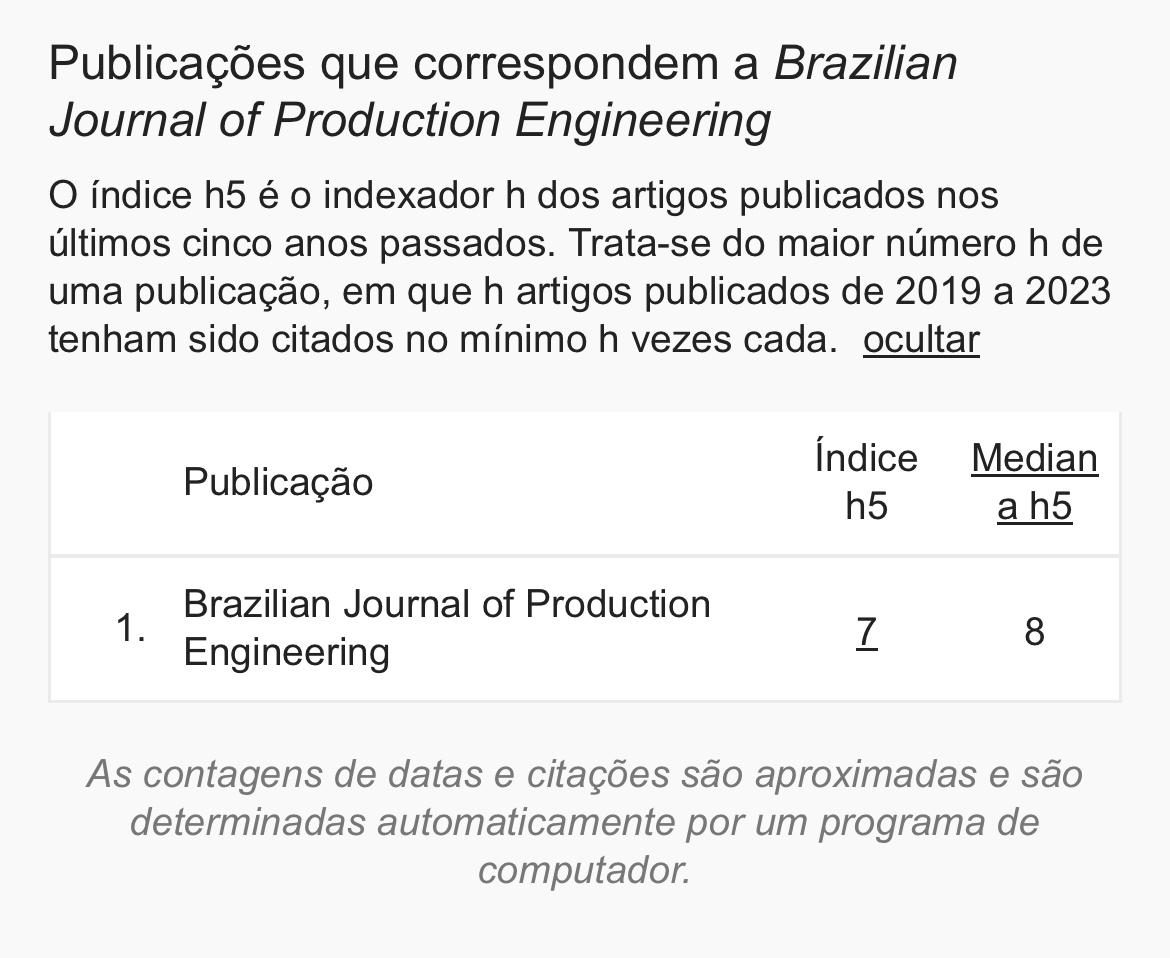Analysis of the quality of work life in the Brazilian telecommunications sector
DOI:
https://doi.org/10.47456/bjpe.v7i2.34855Keywords:
Corporate social responsibility, quality of work life, sustainability, textual analysis, telecommunications sectorAbstract
Context: Quality of Work Life (QWL) has assumed a prominent place in recent years as a component of organizational culture, being one of the pillars of sustainability.
Objective: Identify how the four largest telecommunications groups operating in Brazil understand QWL in this context (two of which listed in the ISEB3/2020 portfolio).
Method: A lexical analysis was carried out, processed by the IRAMUTEQ software, of the sustainability documentation available in the public repositories of these organizations, deployed in the Lexicographic Analysis, Descending Hierarchical Classification and Similitude Analysis.
Results: The results show a prevalence of practices related to occupational health, training, development, and volunteering.
Conclusion: Opportunities for improvement are verified in issues related to stress reduction, mentoring, conflict resolution, awards, and recognition. This research has its originality in the use of the textual analysis technique to the object of study
Downloads
References
Agência Nacional de Telecomunicações (2019). Relatório Panorama Setorial de Telecomunicações. Brasília: ANATEL, 2019.
Agência Nacional de Telecomunicações (2020). Infográfico Panorama Setorial de Telecomunicações: Maio/2020. Brasília: ANATEL, 2020.
Agência Nacional de Telecomunicações (2020). Painéis de Dados – Ranking das Operadoras. Recuperado em 30 de julho de 2020 de: https://www.anatel.gov.br/paineis/acessos/ranking.
Bansal, P.; Jiang, G. F., & Jung, J. C. (2015). Managing responsibly in tough economic times: strategic and tactical CSR during the 2008-2009 global recession. Long Range Planning. 48 (1), 69-79. doi: 10.1016/j.lrp.2014.07.002.
Bizzo, W. A., & Andrade, V. F. (2018). Análise comparativa das normas de gestão de responsabilidade social e sua abrangência. Gestão & Produção. 25(4), 807-825. doi: 10.1590/0104-530x3866-18.
Bowen, H. R. (1953). Social Responsibilities of Businessman. Iowa City: University of Iowa Press.
Bustamente, M. A., Álvarez, A. J., Villalobos, M. E., & Lucero, M. I. (2020). Percepción de la calidad de vida laboral de los trabajadores de los centros de salud familiar de la zona central de Chile. Información Tecnológica. 31(3), 65-74. doi:10.4067/S0718-07642020000300065.
Camargo, B. V., & Justo, A. M. (2013). Iramuteq: Um Software Gratuito para Análise de Dados Textuais. Temas em Psicologia. 21(2), 513-518. doi: 10.9788/TP2013.2-16.
Carvalho, T. S., Mota, D. M., & Saab, F. (2020). Utilização do Software IRAMUTEQ na Análise de Contribuições da Sociedade em Processo Regulatório Conduzido pela Agência Nacional de Vigilância Sanitária. Revista Vigilância Sanitária em Debate. 8(1), 10-21. doi: 10.22239/2317-269x.01429.
Damart, S., & Ledunois, S. A. (2017). Management as an integrating activity – A comparative textual analysis of the work of Mary Parker Follet and Oliver Sheldon. Journal of Management History. 23(4), 452-470. doi:10.1108/JMH-04-2017-0023.
Elkington, J. (1998). Cannibals with forks: The triple bottom line of 21st century business. Environmental Quality Management. 8(1), 37-51. doi: 10.1002/tqem.3310080106.
Fernandes, M. A., Silva, D. R. A., Ibiapina, A. R. S., & Silva, J. S. (2018). Adoecimento mental e as relações com o trabalho: estudo com trabalhadores portadores de transtorno mental. Revista Brasileira de Medicina do Trabalho. 16(3), 277-286. doi: 10.5327/Z1679443520180110.
Fernández, L. V., Bertin, M. J., & Pineaur, F. V. (2014). Prácticas de responsabilidad social, reputación corporativa y desempeño financeiro. Revista de Administração de Empresas. 55(3), 329-334. doi: 10.1590/S0034-759020150308.
Goulart, G. S., Viana, M. M., & Cheung, T. L. (2020). Consumer perception towards familiar and innovative foods: the case of a Brazilian product. British Food Journal. Ahead of print. doi: 10.1108/BFJ-02-2020-0160.
Global Reporting Initiative (2020). About GRI. Recuperado em 02 de junho de 2020 de: https://www.globalreporting.org/information/about-gri/Pages/default.aspx.
Hernandez, M. I. S., Vazquez, D. G., Barcik, A., & Dziwinski, P. (2016). The Effect of the Internal Side of Social Responsibility on Firm Competitive Success in The Business Services Industry. Sustainability. 8(2), 217-231. doi:10.3390/su8020179.
International Organization for Standardization (1996). ISO 14001: 1996 – Abstract and General Information. Recuperado em 20 de maio de 2020 de: https://www.iso.org/standard/23142.html.
Índice de Sustentabilidade Empresarial (2020). O que é o ISE B3. Recuperado em 03 de junho de 2020 de: http://iseb3.com.br/o-que-e-o-ise.
Jhunior, R. O. S., & Vilela, N. G. (2018). Sustentabilidade ambiental, econômica e social: ações e práticas de pequenas e médias empresas brasileiras. Organizações & Sustentabilidade. 6(2), 59-71. doi: 10.5433/2318-9223.2018v6n2p59.
Kim, J.; Milliman, J., & Lucas, A. (2018). Effects of CSR on employee retention via identification and quality-of-work-life. International Jounal of Contemporary Hospitality Management. 32(3), 1163-1179. doi: 10.1108/IJCHM-06-2019-0573.
Lahlou, S. (2011). Text mining methods: an answer to Chartier e Meunier. Papers on Social Representations. 20(38), 1-7.
Madorran, C., & Garcia, T. (2014). Corporate social responsibility and financial performance: the spanish case. Revista de Administração de Empresas. 56(1), 20-28. doi: 10.1590/S0034-759020160103.
Mascarenhas, A. C. Q., & Barbosa, A. C. Q. (2019). Gestão de recursos humanos sustentável e responsabilidade socioambiental: uma agenda para debates. Revista de Administração de Empresas. 59(5), 353-364. doi:10.1590/S0034-759020190505.
Mariappanadar, S. (2020). Do HRM systems impose restricitions on empleyee quality of life? Evidence from a sustainable HRM perspective. Journal of Business Research. 118(1), 38-48. doi: 10.1016/j.jbusres.2020.06.039.
Maslow, R. (1943). A theory of human motivation. Psychological Review. 50(4), 370-396.
Mendes, F. R. P., Zangão, M. O. B., Gemito, M. L. G. P., & Serra, I. C. C. (2016). Representações sociais dos estudantes de enfermagem sobre assistência hospitalar e atenção primária. Revista Brasileira de Enfermagem. 69(2), 343-350. doi: 10.1590/0034-7167.2016690218i.
Mendes, A. M., Tonin, F. S., Buzzi, M. F., & Pontarolo, R. (2019). Mapping pharmacy journals: A lexicographic analysis. Research in Social and Administrative Pharmacy. 15(12), 1464-1471. doi: 10.1016/j.sapharm.2019.01.011.
Milne, M. J., Tregidga, H., & Walton, S. (2003). The triple bottom line: benchmarking New Zealand´s early reporters. University of Auckland Business Review. 5(2), 1-14.
Nazir, O., & Islam, J. U. (2020). Effect of CSR activities on meaningfulness, compassion, and employee engagement: A sense-making theoretical approach. International Journal of Hospitality Management. 90(1), 1-10. doi: 10.1016/j.ijhm.2020.102630.
Orsato, R. J., Garcia, A., Silva, W. M., Simonetti, R., & Monzoni, M. (2015). Sustainability Indexes: why join in? A study of the ‘Corporate Sustainability Index (ISE)’ in Brazil. Journal of Cleaner Production. 96(1), 161-170. doi: 10.1016/j.jclepro.2014.10.071.
Prodanov, C. C., & Freitas, E. C. (2013). Metodologia do Trabalho Científico: Métodos e Técnicas de Pesquisa do Trabalho Acadêmico (2ª ed.). Novo Hamburgo: Feevale.
Qamari, I. N., Ferdinand, A. T., Dwiatmadja, C., & Yuniawan, A. (2020). Transformative interaction capability: the mediating role between quality of work life and teamwork performance. International Journal of Quality and Service Sciences. 2(12), 133-148. doi: 10.1108/IJQSS-01-2019-0008.
Robie, G. L. E., Rosini, A. M., & Oliveira, M. C. (2016). Qualidade de vida no trabalho no contexto da sustentabilidade: Um estudo bibliométrico. Connexio – Revista Científica da Escola de Gestão e Negócios – Universidade Potiguar.
(1).
Salviati, M. E. (2017). Manual do Aplicativo IRAMUTEQ. Recuperado em 09 de julho de 2020 de: http://www.iramuteq.org/documentation/fichiers/manual-do-aplicativo-iramuteq-par-maria-elisabeth-salviati.
Sakar, S., & Searcy, C. (2016). Zeitgeist os chamaleon? A quantitative analysis of CSR definitions. Journal of Cleaner Production. 135(1), 1423-1435. doi: 10.1016/j.jclepro.2016.06.157.
Shulz, S. A., & Flanigan, R. L. (2016). Developing competitive advantage using the triple bottom line: a conceptual framework. Journal of Business & Industrial Marketing. 31(4), 449-458. doi: 10.1108/JBIM-08-2014-0150.
Sierdovski, M., Stefano, S. R., & Andrade, S. M. (2020). Variáveis de qualidade de vida no trabalho como construto de análise do pilar social da sustentabilidade organizacional: Um estudo das práticas nas 150 melhores empresas para se trabalhar no Brasil. Organizações & Sustentabilidade. 8(1), 24-41. doi: 10.5433/2318-9223.2020v8n1p24.
Singhapakdi, A., Lee, D. J., Sirgy, M. J., & Senasu, K. (2015). The impact of incongruity between an organization´s CSR orientation and its employees´ CSR orientation on employee´s quality of work life. Journal of Business Research. 68(1), 60-66. doi:10.1016/j.jbusres.2014.05.007.
Sinval, J., Sirgy, M. J., Lee, D., & Marôco, J. (2019). The Quality of Work Life Scale: Validity Evidence from Brazil and Portugal. Applied Research Quality Life. Ahead of print. doi: 10.1007/s11482-019-09730-3.
Sirgy, M. J., Efraty, D., Siegel, P., & Lee, D. J. (2001). A New Measure of Quality of Work Life (QWL) based on Need Satisfaction and Spillover Theories. Social Indicators Research. 55(3), 241-302. doi:10.1023/A:1010986923468.
Sirgy, M. J., Reilly, N., Wu, J., & Efraty, D. (2008). A work-life identity model for well-being: Towards a research agenda linking quality of work life programs with quality of life. Applied Reseach Quality Life. 3(3), 181-202. doi:10.1007/s11482-008-9054-6
Sivaraman, A. (2020). Soft side of digital transformation: The connected employee. South Asian Journal of Human Resources Management. 7(1), 121-128. doi: 10.1177/2322093720919336.
Uesangkomsate, P. (2019). Exploring green logistics management in Thai small and medium-sized food exporters. Proceedings of IEEE International Conference on Industrial Engineering and Engineering Management, Macau. 194-198. doi: 10.1109/IEEM44572.2019.8978917
Wardani, L. M. I., & Anvar, M. S. (2019). The role of quality of work life as mediator: psychological capital and work engagement. Humanities & Social Sciences Reviews. 7(6), 447-463. doi:10.18510/hssr.2019.7670.
World Comissionon Environmentand Development (1987). Our Common Future - Brundtland Comission. Oxford: Oxford University Press.
Downloads
Published
How to Cite
Issue
Section
License
Copyright (c) 2021 Brazilian Journal of Production Engineering - BJPE

This work is licensed under a Creative Commons Attribution-NonCommercial-ShareAlike 4.0 International License.

















































































